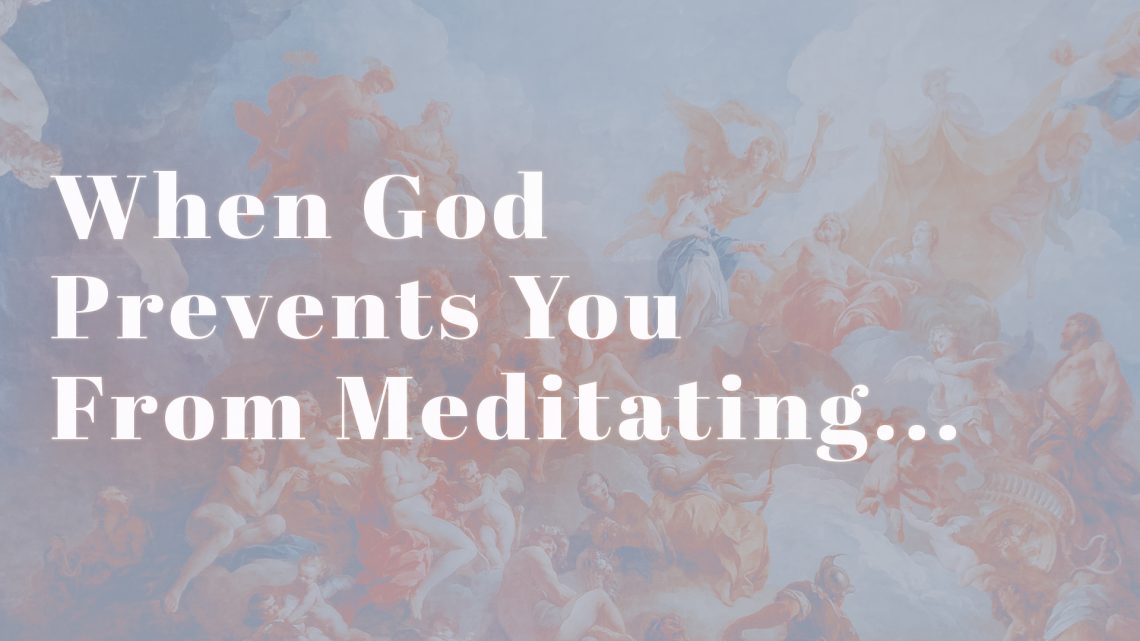From the Ascent of Mt. Carmel Book 2 Chapter 13
St John of the Cross writes:
The signs for recognizing in spiritual persons when they should discontinue discursive
meditation and pass on to the state of contemplation.
1. To avoid obscurity in this doctrine it will be opportune to point out in this chapter when one
ought to discontinue discursive meditation (work through images, forms, and figures) so that
the practice will not be abandoned sooner or later than required by the spirit. At the proper
time one should abandon this imaginative meditation so that the journey to God may not be
hindered, but, so that there is no regression, one should not abandon it before the due time.
For though the apprehensions of these faculties are not a proximate means to union for
proficients, they are a remote means for beginners. By these sensitive means beginners
dispose their spirit and habituate it to spiritual things, and at the same time they void their
senses of all other base, temporal, secular, and natural forms and images. Hence we will
delineate some signs and indications by which one can judge whether it is the opportune time
for the spiritual person to discontinue meditation.
2. The first is the realization that one cannot make discursive meditation or receive satisfaction
from it as before. Dryness is now the outcome of fixing the senses on subjects that formerly
provided satisfaction. However, as long as one can make discursive meditation and draw out
satisfaction, one must not abandon this method. Meditation must be discontinued only when
the soul is placed in that peace and quietude to be spoken of in the third sign.
3. The second sign is an awareness of a disinclination to fix the imagination or sense faculties
on other particular objects, exterior or interior. I am not affirming that the imagination will cease
to come and go-even in deep recollection it usually wanders freely-but that the person does
not want to fix it purposely on extraneous things.[ 1]
4. The third and surest sign is that a person likes to remain alone in loving awareness of God,
without particular considerations, in interior peace and quiet and repose, and without the acts
and exercises (at least discursive, those in which one progresses from point to point) of the
intellect, memory and will. Such a one prefers to remain only in the general loving awareness
and knowledge we mentioned, without any particular knowledge or understanding.
5. To leave safely the state of meditation and sense and enter that of contemplation and spirit,
spiritual persons must observe within themselves at least these three signs together. [2]
6. It is insufficient to possess the first without the second. It could be that the inability to
imagine and meditate derives from one’s dissipation and lack of diligence. The second sign,
disinclination and absence of desire to think about extraneous things, must be present. When
this inability to concentrate the imagination and sense faculties on the things of God proceeds
from dissipation and tepidity, there is yearning to dwell on other things and an inclination to
give up meditation. Neither is the realization of the first and second sign sufficient if the third
sign is not observed with them. When one is incapable of making discursive meditation on the
things of God and disinclined to consider subjects extraneous to God, the cause could be
melancholia or some other kind of humor[ 3] in the heart or brain capable of producing a
certain stupefaction and suspension of the sense faculties. This anomaly would be the
explanation for want of thought or of desire and inclination for thought. It would foster in a
person the desire to remain in the delightful ravishing. Because of this danger, the third sign,
the loving knowledge and awareness in peace, and so on, is necessary.
7. Actually, at the beginning of this state the loving knowledge is almost unnoticeable. There
are two reasons for this: First, the loving knowledge initially is likely to be extremely subtle and
delicate, almost imperceptible; second, a person who is habituated to the exercise of
meditation, which is wholly sensible, hardly perceives or feels this new insensible, purely
spiritual experience. This is especially so when through failure to understand it one does not
permit oneself to rest in it but strives after the other, more sensory experience. Although the
interior peace is more abundant, the individual allows no room to experience and enjoy it. But
the more habituated persons become to this calm, the more their experience of this general
loving knowledge of God will increase. This knowledge is more enjoyable than all other things
because without the soul’s labor it affords peace, rest, savor, and delight.
— The Collected Works of St. John of the Cross (includes The Ascent of Mount Carmel, The
Dark Night, The Spiritual Canticle, The Living Flame of Love, Letters, and The Minor Works) by
St. John of the Cross













No Comment